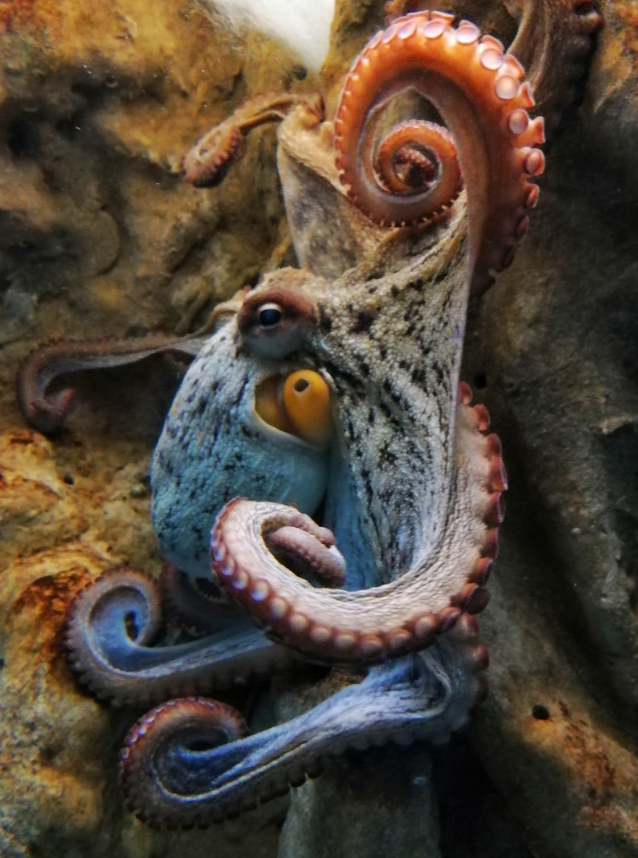Chile takes a visionary step to protect octopuses and the oceans
By Magdalena Lopez, Fundacion Veg and Catalina Lopez, Director of the Aquatic Animal AllianceA crucial step in the global effort to prevent octopus farming took place last week with the introduction of a bill to ban this industry in Chile. This initiative represents a coordinated achievement between Fundación Veg and the Aquatic Animal Alliance, combining local leadership with international technical support. In this collaborative blog, we reflect on the strategy behind the proposal, how it was developed through joint efforts, and why it represents a turning point for aquatic animal protection in Latin America.
Magdalena Lopez, Fundación Veg:
On October 15, Fundación Veg took a historic step in the defense of marine ecosystems. In collaboration with Congresswoman Marisela Santibáñez, we submitted Bill No. 17913-12 to Congress, which proposes to ban the installation, operation, or functioning of centers or farming systems for the breeding, reproduction, or fattening of octopod species throughout the national territory.
Although there are currently no octopus farms in Chile, we know that their development is a latent threat. For years, the state has funded research into their cultivation, and international experience shows that when this industry takes hold, the environmental and ethical consequences are serious and difficult to reverse. That is why this bill takes a preventive approach: it seeks to ensure that Chile stays ahead of the curve and positions itself as a visionary country in the protection of the sea, biodiversity, and marine animals.
For months, we worked on a cross-cutting lobbying strategy to build political support from different sectors. It was essential that the project reflect a broad consensus, beyond partisan differences, and that it be understood as a cause without political bias: a commitment to the protection of our oceans and the sustainability of ecosystems.
From the outset, we decided that the focus should be environmental and ecosystemic, not ethical. We wanted the legislative debate to focus on the ecological impacts of industrial octopus farming and the dangers to public health: the intensive use of resources, marine pollution, the disruption of the natural balance of species, and the transmission of zoonotic diseases. This decision allowed the bill to be taken seriously by various political parties.
At the same time, some parliamentarians tried to refer it to the Fisheries or Economy Committee for discussion, on the grounds that it concerned a potential new industry. However, we insisted that the core of this proposal is not economic, but environmental and conservation-related. After a close vote, the Chamber decided that the initiative should be discussed in the Environment and Natural Resources Committee. That resolution was key: it ensures that the bill will be analyzed from the right perspective and with experts who can assess its ecological and ethical implications.
The structure of the bill was also important: we decided to present a new bill for a ban, rather than an amendment to the current Fisheries Law or the Aquaculture Concessions Regulation. On the one hand, this is because a new Fisheries Law is currently being drafted, and if that process moves forward, the law to be amended could be repealed. On the other hand, in that scenario it would have been almost impossible to divert the discussion of the Fisheries Commission.
Learning from international experience
There are already campaigns around the world seeking to close and ban octopus farms, and the effects of industrial octopus farming are becoming apparent. In Spain and Mexico, where pilot projects have been launched, warnings about animal welfare, pollution, and sustainability have been quick to emerge. What is happening there reminds us that prevention is always more effective, easier, and fairer than remediation.
We believe that Chile has a unique opportunity to learn from these experiences and chart a different course: one that protects its seas before an unsustainable industry attempts to establish itself. This bill is not just about octopuses; it is about how we choose to relate to nature and animals, and the responsibility of a coastal country to care for its marine heritage.
Another key factor was the collaboration of international allies such as the Aquatic Animal Alliance (AAA) and the Aquatic Life Institute (ALI) for their technical and strategic support. Their legislative review, guidance on approach, and provision of scientific information were essential in strengthening the text and the advocacy process.
Collaboration to continue
We are at a very early stage of the legislative process. Although we have made progress with a strategic vision that keeps us optimistic, the challenges ahead are enormous: the presentation of the bill is just the beginning. At Fundación Veg, we believe that lasting progress is built through collaboration. That is why we extend an invitation to all organizations and individuals who are part of the Aquatic Animal Alliance—and to those who work for marine animals in any country—to collaborate, share experiences, data, and strategies that strengthen this common cause.
Protecting aquatic animals and the ecosystems they inhabit requires a global perspective, but also local actions based on conviction and evidence. Today, Chile is in a visionary position, but we know that political shifts in Congress and the government will be major challenges. We hope that focusing on conservation and protection of the marine ecosystem, rather than animal welfare, will be effective. Nowhere in the bill or the minutes do we mention animal welfare or the ethological characteristics of octopuses, although that is our true inspiration.
We will continue working to advance this bill in Congress so that, very soon, we can proudly say that Chile has become the first country in South America to ban octopus farms. Let's stay in touch.
Catalina Lopez, Director of the Aquatic Animal Alliance:
The bill introduced in Chile to prohibit octopus farming represents more than a national achievement. It sets a precedent that can shape policy discussions across Latin America and strengthen the integration of aquatic animal protection within regional environmental and biodiversity agendas.
For the Aquatic Animal Alliance, this development is a significant opportunity to advance preventive approaches to aquaculture across the region. Many countries are facing increasing pressure to expand intensive aquaculture, often without fully evaluating the ecological, social, and ethical consequences. Chile’s initiative demonstrates that governments can act early, guided by scientific evidence and sustainability objectives, to avoid the environmental and welfare challenges already observed in other parts of the world. This is especially relevant in Chile, which ranks among the ten largest aquaculture producers worldwide.
The AAA is now working to position this progress within a broader regional framework. By documenting Chile’s legislative process, identifying effective arguments, and sharing these findings with policymakers in countries such as Mexico, Colombia, and Ecuador, we aim to support informed decision-making and the development of coherent standards for aquatic animal protection.
This collaboration also highlights how international partnerships can strengthen national advocacy efforts. Fundación Veg’s leadership, combined with technical support from the Alliance, has created a model for evidence-based cooperation that can be replicated in other legislative contexts. Our priority moving forward is to ensure that this initiative continues to advance through Congress and that it informs similar policy discussions throughout Latin America.
Adapting advocacy strategies to local contexts is essential for achieving lasting policy outcomes. In Chile, the decision to frame the proposal around environmental protection rather than ethics or animal welfare was a deliberate and pragmatic choice. Legislative progress often depends on aligning messages with existing political priorities and public discourse. By emphasizing the ecological impacts of intensive aquaculture, such as marine pollution, resource depletion, and biodiversity loss, the proposal gained credibility among decision-makers and avoided being dismissed as a niche or moral issue. This flexibility does not diminish the underlying commitment to animal welfare; rather, it strengthens it by ensuring that the principles of protection are advanced through arguments that resonate with the national context and have a higher likelihood of being enacted into law.
The significance of this moment extends beyond Chile. It shows that coordinated action, grounded in science and guided by a shared commitment to aquatic animal welfare and ocean conservation, can shape the regional policy agenda. With continued collaboration and sustained engagement, Latin America has the opportunity to establish itself as a global leader in the protection of aquatic animals and marine ecosystems.




